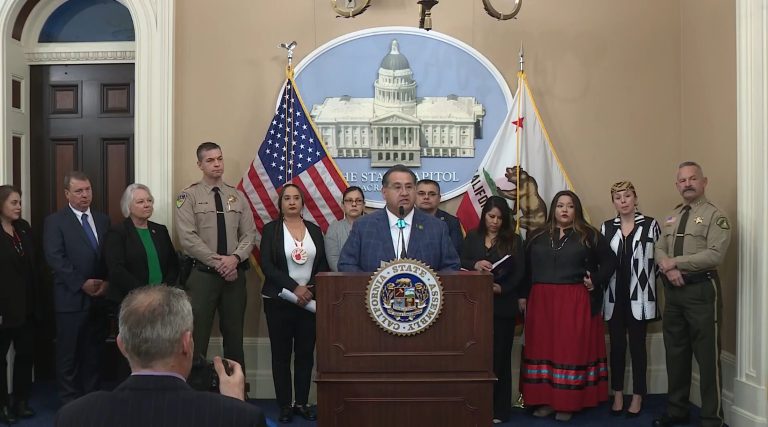Podcast: Play in new window | Download | Embed

Anchor: Antonia Gonzales
Secretary of the Interior Deb Haaland says in the last two years, the Biden administration has committed to working with tribes and has made many investments in Indian Country.
Sec. Haaland delivered opening remarks at the White House Tribal Nations Summit Wednesday morning, which is being held in person in Washington, D.C. and streamed live here:
She told tribal leaders, the Interior Department alone, has invested more than $45 billion in Indian Country through the American Rescue Plan, the Bipartisan Infrastructure Law, and the Inflation Reduction Act.
Sec. Haaland talked about a land transfer for Montana tribes, and announced a new oral history project slated for 2023 for Indian boarding school survivors.
“This has never been undertaken by the United States government and is a resource many of you have requested as part of your own work to document your own history. This project demonstrates the new era I spoke of. Over the next two days, you’ll hear even more of the work that is happening and the opportunities with your partnerships that lie ahead.”
Sec. Haaland announced the creation of a new office of strategic partnerships, which is working to build nine new Bureau of Indian Education school yards across the country. She touched on tribal co-stewardship to address climate change, and co-management of lands and waters.
She says there is work being done to expand broadband through an agreement to help bring electromagnetic spectrum access to tribal lands.
Sec. Haaland says she’ll be meeting with tribal leaders throughout the next two days to discuss issues impacting Indian Country.
Wednesday morning also included tribal leaders and administration officials taking part in a panel on education and Native languages.
Tribal leaders from the 574 federally recognized tribes were invited to take part in the two-day summit.
 During the White House Tribal Nations Summit, President Joe Biden proclaimed a Nevada sacred site off limits to development with the formal designation of Avi Kwa Ame as a national monument.
During the White House Tribal Nations Summit, President Joe Biden proclaimed a Nevada sacred site off limits to development with the formal designation of Avi Kwa Ame as a national monument.
Native groups have been advocating for its protection.
The area is sacred to 12 tribes and is the center of creation stories says Taylor Patterson with the Native Voters Alliance Nevada.
“It’s the place where all of their traditional stories and knowledge comes from. And then for our Southern Paiute Tribes in the area, it’s also a part of the Salt Song trail. And so that tells, really, the life cycle of Paiute people and how they moved through the land and all the important places, plants and animals in the area.”
It is located between the Lake Mead National Recreation Area and the Nevada/California border, covering nearly 450,000 acres in southwestern Nevada.

Photo: Bad River Band of Lake Superior Chippewa Tribe
A federal judge has ordered Enbridge and the Bad River Tribe in Wisconsin to come up with a joint plan to avoid a catastrophic spill from an oil and gas pipeline should erosion worsen on the tribe’s reservation.
Danielle Kaeding reports.
The ruling stems from the tribe’s lawsuit that seeks to shut down the Canadian energy firm’s pipeline on its reservation.
Enbridge’s Line 5 pipeline will continue to operate, but U.S. District Judge William Conley said risk of a significant rupture exists where it crosses the Bad River.
Conley said the negative effects in the Bad River watershed and Lake Superior could be catastrophic.
The line carries up to 23 million gallons of oil per day from Superior across northern Wisconsin to Sarnia, Ontario.
The federal judge ordered Enbridge and Bad River to meet by December 17 to discuss installation of emergency shutoff valves, a joint proposal for shutting down and purging the line, and projects that could slow further erosion.
The two must submit their proposal by Christmas Eve.
Get National Native News delivered to your inbox daily. Sign up for our newsletter today.



